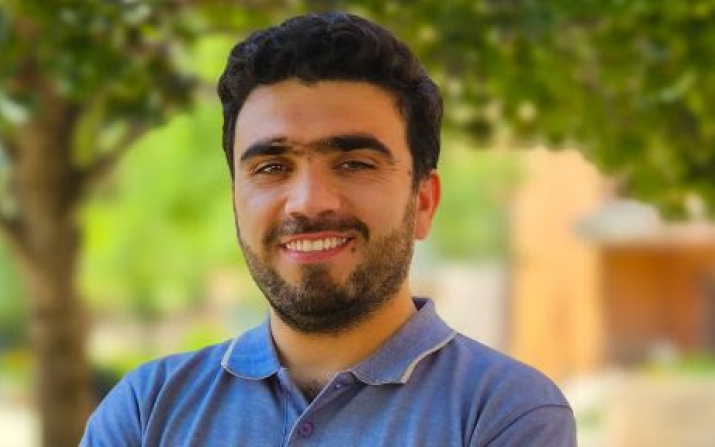Postdoc Spotlight of the Month: Muhammad Zeeshan

To recognize the contributions postdoctoral researchers make to Case Western Reserve University—and their respective fields—The Daily has partnered with the Office of Postdoctoral Affairs on a new monthly series. Know an outstanding postdoc making an impact at CWRU or in their field? Nominate them to be featured in this series.
Since joining the Department of Chemical and Biomolecular Engineering in August 2022, Muhammad Zeeshan has pursued a specific goal: reducing greenhouse gas emissions.
Originally from a small town in Pakistan, Zeeshan is now a postdoc in Burcu Gurkan’s Energy Lab at CWRU. Here, he’s working toward developing novel composite sorbents for capturing and converting CO2 directly from the air. These sorbents can be regenerated using electromagnetic fields such as microwave irradiations, making them a promising complement to clean energy efforts.
Working with his team, Zeeshan designs ionic liquid (IL)-based MOFs to overcome the limitations of bulk ILs, which have high viscosity and hinder CO2 movement. In other words? He’s working to make air cleaner, faster.
As part of his work, Zeeshan hopes to explore a new mode of energy transfer that targets CO2-rich regions within the sorbent to facilitate regeneration. These hybrid materials with multi-scale interfaces for CO2 transport and capture are created while enabling a novel mode of energy transfer that is targeted for the CO2-rich domains for regeneration, a proof-of-concept that has just been accepted for publication in the journal ACS Materials Letters.
Zeeshan also received a poster award at the Gordon Research Conference Separation Science meeting in recognition of his work in material development for CO2 capture and alternative regenerations. The award was funded by the U.S. Department of Energy Office of Science.
Alongside graduate students in Gurkan’s lab, Zeeshan also recently evaluated the impact of hydrogen bonding on CO2 binding sites in deep eutectic solvents and the role of functionalized hydrogen bond acceptors and hydrogen bond donors on composition–property relationships of eutectic solvents and their impact on CO2 capture. The group recently shared their work in the American Chemical Society’s Sustainable Chemistry & Engineering and Green Chemistry, published by the Royal Society of Chemistry.
Moreover, in a significant collaborative effort, they recently published a review article on reactive capture and electrochemical conversion of CO2 with ILs and DESs in RSC Chemical Society Reviews and perspective article on direct air capture of CO2.
Before coming to CWRU, Zeeshan earned his PhD degree in chemical engineering from Koc University, Turkiye. His doctoral dissertation was focused on modifying the structure of metal-organic frameworks, graphene aerogel, and activated carbon with ionic liquids to tune their gas adsorption and separation performances. Outside of his lab work and research, Zeeshan enjoys traveling to explore nature and hiking, learning innovative technologies, and cooking traditional Pakistani food.
1. What has been your best experience so far as a CWRU postdoc?
My postdoc experience at the Energy Lab under Prof. Burcu Gurkan has been gratifying. I’m surrounded by a fantastic team of colleagues who are incredibly supportive in every aspect of my work.
One of the highlights of my experience at CWRU has been the constant exposure to brilliant academicians and scientists. The career series webinars offered by the postdoc office and CWRU Postdoc Association have been invaluable in addressing many questions I’ve had along the way.
Furthermore, I had the privilege of attending the American Chemical Society (ACS) Fall 2023 meeting in San Francisco. I have also participated at the distinguished Gordon Research Conference in Galveston, Texas. These conferences not only expanded my network but also allowed me to establish connections with prominent scientists, fellow postdocs and researchers.
2. How do you think the postdoctoral experience at CWRU is helping you prepare and advance toward your goals?
The diverse projects within the group have exposed me to a broad range of research areas, expanding my scientific horizons. The weekly group meetings at our department encourage open discussion, allowing me to share my experimental plans and gain valuable insights into ongoing research and outcomes. This collaborative environment has significantly improved my interpersonal and communication skills and critical thinking abilities.
Likewise, attending conferences and workshops has allowed me to expand my professional network beyond my institution. The postdoc office has also played a crucial role in my professional growth by organizing career workshops and facilitating discussions with experienced postdocs, furnishing invaluable guidance for my future career trajectory.
3. What’s your best piece of advice on how postdocs can make the most of their postdoc career and prepare for their future goals?
Based on my experience, I will advise aspiring postdoc fellows to focus on their research passion, actively develop analytical and communication skills by learning from their mentors, and participating in workshops and conferences to build your network.
More importantly, always remember to define your long-term goals and tailor your postdoc experience to align with them. Opening communication with your mentor about your aspirations is critical. Similarly, consider grant writing if academia interests you.
Finally, maintain a healthy work-life balance to avoid burnout and ensure a successful and rewarding postdoc journey.
